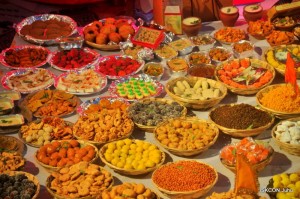The Food Safety and Standards Association of India (FSSAI) has said it intends to regulate public kitchens run by temple trusts in association with state regulators.
 The food regulator had approached the Siddhivinayak and Shirdi temple trusts in Maharashtra and found them open to the idea of scrutiny, said Pawan Agarwal, the chief executive officer of FSSAI.
The food regulator had approached the Siddhivinayak and Shirdi temple trusts in Maharashtra and found them open to the idea of scrutiny, said Pawan Agarwal, the chief executive officer of FSSAI.
“While temple trusts do get a licence from the FSSAI to run public kitchens, we are speaking of taking public health and safety to the next level by adhering to food safety standards. This calls for greater awareness and scrutiny, which we propose to do along with state food regulators.”
Sanjiv S Patil, executive officer of Shree Siddhivinayak Ganapati Temple Trust, said the regulator had surveyed the temple’s public kitchen two months ago and advised them on food safety standards. “We have joined hands with the FSSAI and the Association of Food Scientists & Technologists of India for standardisation and to maintain the quality of the prasadam we offer. We are committed to maintaining our quality standards.”
Nearly 100,000 devotees visit the Shree Siddhivinayak temple each day in Mumbai.
In Kerala, where the popular Sabarimala temple is located, food safety officers do checks at regular intervals to ensure the food served at the temple is safe.
 An editorial in The Tribune says, only gods (note the plural, monotheism is sorta boring) know if they would like to taste FSSI-standardised bhog and prasad. The food regulator is hoping to ensure the “safety” of prasad distributed in temples and at other religious places. Its approach is secular, however.
An editorial in The Tribune says, only gods (note the plural, monotheism is sorta boring) know if they would like to taste FSSI-standardised bhog and prasad. The food regulator is hoping to ensure the “safety” of prasad distributed in temples and at other religious places. Its approach is secular, however.
According to the 2001 Census, India has 2.4 million places of worship, visited by approximately 300 million people every day. the FSSAI has already begun standardising prasad at famous temples like Shri Siddhivinayak temple (Mumbai), Sri Venkateswara Swamy temple (Tirupati) and Sai Baba temple (Shirdi), the fate of its crusade would rest with millions of bhakts. Will they like to have the food, supposedly partaken by the gods, after it is sullied in the name of sanitising and standardising by the FSSAI?
Where faith is at work, even angels fear to tread! But the FSSAI assumes to straighten up complex socio-cultural issues. The organisation is in its infancy. Launched only in 2006, it has no judicial power to punish offenders.
